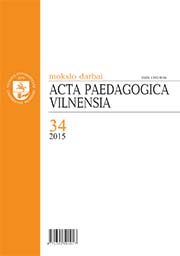Jaunesniųjų paauglių požiūris į dorovines vertybes
Adolescents’ attitude to moral values
Author(s): Snieguolė VaičekauskienėSubject(s): Gender Studies, Ethics / Practical Philosophy, School education, State/Government and Education, Social development, Sociology of Culture
Published by: Vilniaus Universiteto Leidykla
Keywords: morals values; adolescents; attitudes; school; General Education Curriculum;
Summary/Abstract: In modern society, frequently more attention is given to the economic efficiency and the added value created by the public members more than moral dilemmas, human relationships and the meaning of life. However, the sustainability of the development of society largely depends on the dominant values. Therefore, it is important not only to help a child to understand the main and undisputed values and to follow them, but also to analyze the modern teenagers’ approach to values – what values are important for them and how they are able to define the content of moral values. 73 Įteikta: 2015 02 02 Priimta: 2015 05 18 This study has revealed that the knowledge of contemporary younger teens about moral values is frequently average. However, more than half of the surveyed students were able to explain and properly reveal a chosen moral characteristic. The most obvious differences among separate groups of students were set while assessing the following factors: gender, involvement in non-formal education activity, students’ learning achievements. Students’ wellbeing at school is a significant but not the most important factor: during the study, a similar level of moral knowledge was shown by students who felt good at school as by well as those for whom school was not always good. After review of values that are most important for younger teens, it has been found that to every fourth student most valuable is friendliness, to every seventh kindness, to every eighth mutual assistance, to every tenth sincerity and goodwill. Honesty is important only to the every twenty- eighth student who participated in the study. The survey data suggest that schools should be attentive particularly to the socially and culturally marginalized adolescents – to teach them a positive assessment of the environment, to promote their interests to choose the formal and non-formal education activities. Also, the education of honesty, responsibility, dignity, authenticity which are emphasized in the General Education Curriculum and other educational documents, should be accounted for
Journal: Acta Paedagogica Vilnensia
- Issue Year: 2015
- Issue No: 34
- Page Range: 62-73
- Page Count: 12
- Language: Lithuanian

